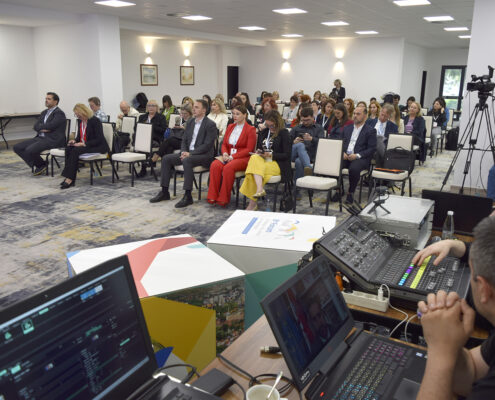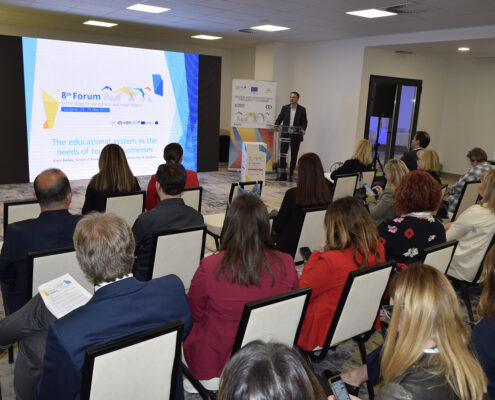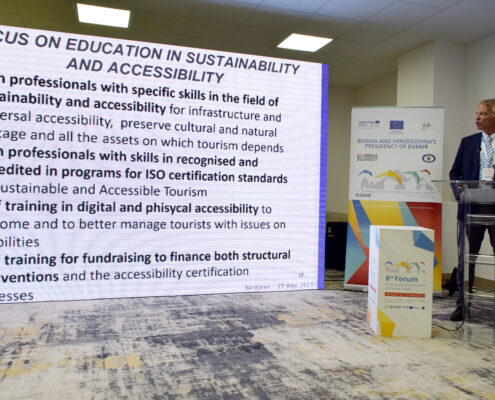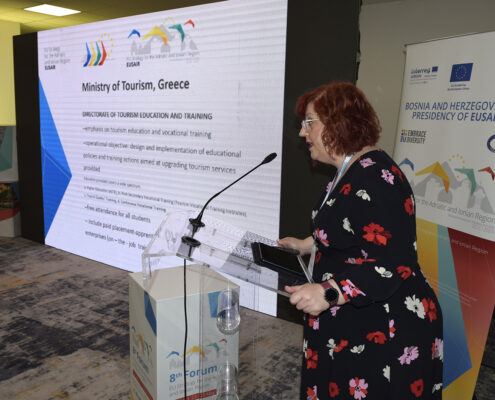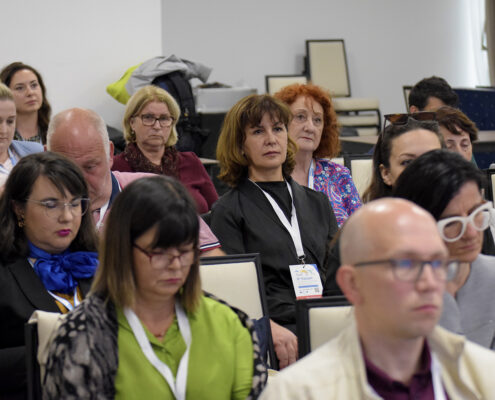8th Annual EUSAIR Forum
Sarajevo, Bosnia and Herzegovina | 23-25 May 2023Conclusions for the Pillar IV Session:
Educated and skilled workforce for sustainable tourism in EUSAIR region
"Tourism is more than a leisure activity and requires a professional and skilled workforce."
The lack of manpower in the field of tourism and its mismatch with the needs of the sector is a key issue for the development of tourism, and the Ministry of Tourism and Sports raised this problem to the level of the entire Adriatic-Ionian region by organizing a thematic panel as part of the 8th EUSAIR Forum held in Sarajevo last week. The Educated and Qualified Workforce for Sustainable Tourism in the EUSAIR region marked the beginning of the European Year of Skills with the panel, and experts from the European Commission, San Marino, Greece, Montenegro, North Macedonia, Serbia and Bosnia and Herzegovina participated in the discussion. The Ministry of Tourism and Sports is the coordinator of thematic pillar 4 Sustainable tourism of the EU Strategy for the Adriatic and Ionian Region and a partner in the EUSAIR Facility Point project.
"Tourism is more than just a leisure activity. It has become a powerful driver of economic growth, job creation and cultural exchange. It transcends borders, connects people and enriches lives. However, in order to fully utilize the potential of tourism, we must invest in education and equip individuals with the necessary skills to navigate this dynamic industry", said State Secretary in the Ministry of Tourism and Sports of the Republic of Croatia Tonči Glavina in his opening speech.
The Adriatic-Ionian region offers 118 different courses dedicated exclusively to the topic of sustainable tourism, within 76 programs and 87 higher education institutions, the panel stated. Tourism, as an extremely dynamic sector, requires continuous lifelong learning and investments, especially in communication skills in native and foreign languages, non-verbal communication, digital literacy, problem solving and adaptability, taking initiative and leadership, and the like.
Croatia has already taken significant steps in this area by establishing regional centres of competence in the field of tourism, by continuously financing lifelong learning programs of educational institutions, as well as associations in the field of tourism. A large part has yet to be realized, for which strategic frameworks have been set and financial resources secured. Croatia finances the activity "Strengthening the capacity of the system for resilient and sustainable tourism" from the National Recovery and Resilience Plan. The investment worth 1.3 million euros includes the creation of educational programs and the training of unemployed persons for certain jobs in tourism, as well as the education of employees in the system of state administration and tourist boards.
Lack of labour and the challenges of importing it
Greece is focusing the resources of the National Recovery and Resilience Plan on designing and planning the implementation of training programs for upskilling and reskilling of approximately 18,000 users. Among them are seasonal workers, long-term unemployed and employees affected by the consequences of the impact of COVID-19 on tourism businesses.
Unlike Croatia and Greece, Serbia faces not only the current lack of labour in the tourism sector, but also the weak interest of young people in education and professions in tourism, which will have long-term consequences for the sector. Aleksandar Vasilijević, director of the Hilton Hotel in Belgrade, stated that more than 50% of the capacity of educational institutions in the area remains unfilled. A large part of the workforce of the tourism sector in Serbia migrated to delivery services and call centres, where they remained, while a part emigrated to the West in search of better-paid jobs.
The participants in the discussion agreed that opening the labour market for workers from the countries of the Far East, mainly Nepal and India, but also from Kenya and other African countries, is not a good or long-term sustainable solution. There is a large number of unemployed people at employment agencies, but also an unadapted school system that forces children to make decisions at the age of 14, which is certainly not an appropriate age for making important life decisions regarding the choice of a future profession.
"Once you could buy a house by working in tourism, today you can't even pay its rent"
The causes of labour shortages are deeply and structurally rooted in the sector, and apart from the inadequacy of educational programs, those that have recently become increasingly prominent among the general and professional public are excessive workload and low incomes. As the participants from Greece summed it up vividly, "before, people in tourism made good money so that they could buy a house. Today, they don't even earn money for her rent".
"The tourism sector needs educated and qualified people who will carry out the double transition of the sector, digital and green, find and retain new talents. For a resilient EUSAIR region, the issue of education and skills should be made a high priority. In order to slow down the brain drain, young people should be given the opportunity to learn, acquire new skills, and expand their horizons. Youth is curious, brave, impatient. Education is a key instrument for change", concluded the panel on behalf of the organizer Senka Daniel from the Ministry of Tourism and Sports.





